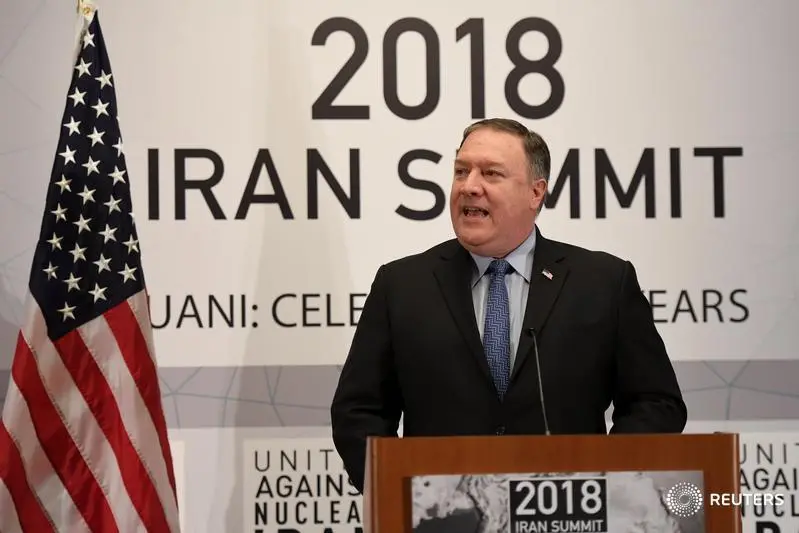PHOTO
The new round of sanctions set to be imposed by the United States on Iran from November 4 will not have a major impact on the Arab financial markets, as, after over a decade of frequent unrest in the region, markets have built up a resilience against geopolitical changes, according to a United Arab Emirates-based economic consultant.
Washington plans to apply sanctions on Iran’s oil and banking sectors from this week are designed to put pressure on the Islamic Republic to scrape its nuclear energy program, which the U.S. and its allies believe aims to create an atomic bomb. Former American President Barack Obama had secured a landmark agreement between Iran, the U.S. and other international powers in 2015 that included a gradual withdrawal of the sanctions on Iran in exchange of more transparency on Iran’s nuclear plans. The deal was later revoked by Obama’s successor, President Donald Trump, who assumed office in January 2017.
When Obama left office in January 2017, Washington was well along in a modernization program to make nearly all of its nuclear weapons more accurate and deadly (Read the full special Reuters report here).
“The geopolitical risk is one of the factors that affects the markets and economies in general in the region. But from my follow-ups on the geopolitical changes in the region since Lebanon’s 2006 war until now, the increase in the number of such events, whether in Iraq, Libya, Syria, Yemen, Bahrain or Sudan, have made the region become used to such incidents and hence made any negative impact big but fades quickly,” Wadah Al Taha, an investment consultant and member in the Chartered Institute for Securities & Investment, told Zawya in a phone interview on Sunday. The CISI is a professional body for individuals working in wealth management and capital markets.
Al Taha was referring to the political unrests and wars that erupted in the aftermath of the Arab spring protests, which started in 2011 and left Libya, Syria and Yemen in deadly conflicts.
Sudan has been in civil wars for decades. One ended a few years ago with the separation of the north and the south and the creation of the South Sudan state in July 2011. However, the Arab African nation is facing another internal conflict in the western Darfur region where anti-government rebels have been fighting against the state since 2003.
“The region’s market has gained the ability to absorb the effects of the geopolitical events. Tomorrow the sanctions on Iran will start, I don’t think this will have a negative impact on the region’s markets,” Al Taha added.
Sunni-led Saudi Arabia and the UAE are the strongest opponents of Iran in the Arab region. The kingdom accuses Shi’ite Iran of fuelling conflicts in the region and interfering in Arab states’ internal affairs.
On Saturday, the UAE’s minister of state for foreign affairs, Anwar Gargash, said that Iran's "aggressive policies" were "largely responsible" for the re-introduction of sanctions, according to Reuters.
Late last September, Iran’s Revolutionary Guards - the state’s strongest military force- warned Saudi Arabia and the UAE to respect Tehran’s “red lines” or face retaliation.
The Iranian Supreme Leader Ayatollah Ali Khamenei had accused the Gulf Arab states of carrying out a shooting attack on a military parade that killed 25 people in September. Many of those killed were members in the country’s Revolutionary Guards.
“We have become used to the Iranian policies, statements and threats. I don’t think they - at the current stages - will have a direct impact on (the region’s) markets,” Al Taha said.
He said the sanctions could have a positive impact on the oil market and hence on the Gulf Arab region. “The international market could stabilise due to decreases of the supply of Iran’s oil,” he added.
The world’s three largest producers - Russia, Saudi Arabia and the U.S. - have indicated that they were pumping at record or near-record levels, Reuters reported on Sunday. On Friday, the U.S. has said it will allow eight importers to keep buying Iranian oil.
Oil prices dropped on Monday. Front-month Brent crude futures were at $72.39 per barrel at 0142 GMT on Monday, down 44 cents, or 0.6 percent from their last close. U.S. West Texas Intermediate (WTI) crude futures were down 53 cents, or 0.8 percent, at $62.61 a barrel. (Read the full market outlook here).
Further Reading:
• Video: ZAWYA Market Soundbites - The impact of U.S. sanctions on the sale of Iranian oil, the impact on prices
• Oil market passes cyclical peak - John Kemp
• Oil falls as U.S. grants Iran sanction waivers to eight importers
• Iran seeks European assurances as U.S. oil sanctions loom
• Zawya’s Special Coverage on Iran after sanctions
(Writing by Yasmine Saleh; Editing by Shane McGinley)
(yasmine.saleh@refinitiv.com)
Our Standards: The Thomson Reuters Trust Principles
Disclaimer: This article is provided for informational purposes only. The content does not provide tax, legal or investment advice or opinion regarding the suitability, value or profitability of any particular security, portfolio or investment strategy. Read our full disclaimer policy here.
© ZAWYA 2018





















